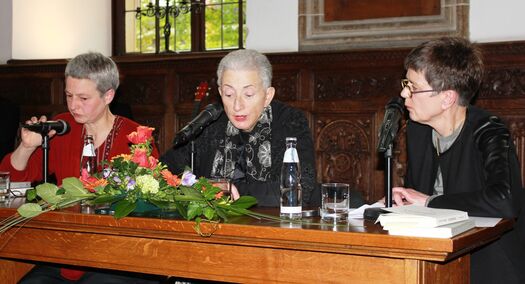The French writer Hélène Cixous presented her book "Osnabrück" in the Peace Hall of the City Hall

Osnabrück as a childhood paradise
Osnabrück, May 8, 2017
For her, writing was an intervention against a world that had been destroyed into small pieces, Hélène Cixous tells us. The French writer and feminist says of herself that she came to writing at the age of four. In her oeuvre, the 79-year-old has, among other things, come to terms with the origins of her Jewish family - and thus also with the departure of her mother from the city of her childhood: Osnabrück. Eva Klein had to emigrate in the early 1930s to escape the National Socialists. Now Hélène Cixous has presented her book, which bears the name of the city as its title, in the Peace Hall of the town hall. It was published in France in 1999, and the German translation is now available. It was financed by the Friedel & Gisela Bohnenkamp Foundation.
Silence. In her family, too, there was a great silence about the National Socialist era, says Hélène Cixous. But her mother told her a lot about her origins, about her childhood in Osnabrück. Eva Klein had to leave the city suddenly at the age of only 19. "Paradise lost," her mother had called the city. "Of course she did. It was the place where she spent her innocent time as a child," Hélène Cixous emphasizes. Early on, she said, she tried to figure out how her mother must have felt. "But you can't do that from Paris." So she says she is very happy to have come to Osnabrück for the second time now, after 2015. And what did she find? "A lot of love," says the professor of English literature, who switches between French, English and German in conversation without a break.
During the reading, however, she answers questions from Andrea Grewe, Professor of Romance Studies at the University of Osnabrück, in French and has the passages from her book "Osnabrück" that she recites in French translated into German by her translator, Dr. Esther von der Osten. A strong associative language runs through the book. "It's about family history - it's the family of humanity that it's about," says Hélène Cixous, and, "Osnabrück is the key word of my childhood." She herself was born in Oran, Algeria, on June 5, 1937, and only got to know Osnabrück in April 2015.
One of the great French intellectuals, Hélène Cixous helped shape French post-structuralism with her fictional and essayistic work. She is considered one of the most important thought leaders of French feminism. Cixous co-founded the reform university Paris 8 and taught there as a professor of English literature from 1969. To this day, she is an in-house writer at the Théâtre du Soleil, Paris. She has been awarded numerous prizes and honorary doctorates.
Visitors to the discussion evening at the Theater Osnabrück in April 2015, which was held under the title "Osnabrück is Paradise Lost. Just not for me" the University of Osnabrück had invited. During the visit, Dr. Sven Jürgensen, the press spokesman for the city of Osnabrück, had the idea of having the book translated in its entirety. He approached the Bohnenkamp Foundation with the request to support the translation. In addition, the Bohnenkamp Foundation has also financed the translation of another book by Hélène Cixous, which contains conversations with the French writer and philosopher. Hélène Cixous has already processed the experiences and impressions of her first visit to Osnabrück in the book "Gare d`Osnabrück à Jérusalem", which was published in 2016. And the current visit is also to be echoed in another book, Hélène Cixous announced at the end of the reading.
Hélène Cixous: Osnabrück. Passagen-Verlag 2017, translated by Esther von der Osten